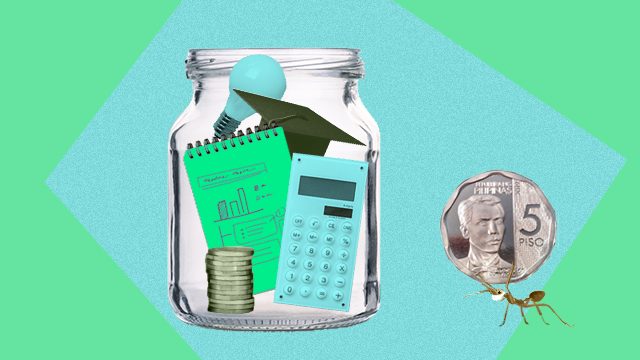SUMMARY
This is AI generated summarization, which may have errors. For context, always refer to the full article.


MANILA, Philippines – Anxiety and confusion now plague the world. Being scared these days is natural. However, additional stress and greater burden can come from money woes as we battle the coronavirus pandemic.
But it is best to keep calm, compose yourself, and come up with a plan to make yourself more financially healthy. It’s better to address your situation head-on and be ready for whatever comes your way rather than be ill-prepared when problems arise.
Here are some tips to prepare yourself financially amid the pandemic:
Name your ICE
In case of emergency or ICE is what you call your emergency contact person. They are the trusted gatekeepers who know the most critical of information about you.
They may be a spouse, parent, sibling, friend, or if you’re old enough, a legal-aged child. They may also be a group. Feel free to assign different vital information about you to several people. For example, in my case, when it comes to my money, my oldest sibling is my ICE. When it comes to my health, my life partner is my ICE.
Make sure that your ICE is willing and would gladly be a go-to person when the need arises. They should know your medical history and be able to legally act on your behalf – it’s best to consult with the proper authorities about this, when in doubt.
Come up with an emergency plan
Gather all your loved ones at home and objectively discuss what’s happening. It’s better to have your ICE with you during this emergency planning.
Talk about realistic what-ifs. For example, what if someone inside your home gets infected with COVID-19. What will you do? Who will you call? Do you have a part of your home which you could turn into an isolation room?
Each family will have its own unique what-ifs, so plan. It’s best to keep level-headed when planning. So, do what you have to do to reduce anxiety among yourselves – whether it’s meditating or praying.
Verify health and life insurance details
Review your health and life insurance policies. Call your insurance agent for details or if there’s information that needs updating. Take note of exclusions, deductibles, and the extent of your health and life insurance covers.
It’s best to get health insurance if you’re still healthy. Don’t wait until you’re old, sick, or already have pre-existing conditions because, by then, companies will most likely reject you.
The person who needs insurance the most are breadwinners and those with dependents. If you don’t have any dependents, insurance may not be a priority because you have no needed income that needs replacing.
Two quick reminders on insurance. First, follow my 5-15-20-60 budgeting rule, where you limit your insurance premium cost to 5% of your income. If you are paying more than 5%, you may be overpaying for insurance.
Second, at all costs, avoid investment-linked insurance or, what is called, variable universal life insurance of (VUL). You’ll just end up spending more than what’s essential.
For more details on insurance, you can read this, where I detail different insurance options in preparation for the COVID-19 pandemic.
Take stock of your emergency funds
Emergency funds should ideally be good for six months of spending (not easy, I know). It should be in a safe or be in liquid financial products, like a bank savings account.
Right now, the government-enforced community quarantine will be in effect until April 12. However, don’t discount the possibility of extension. Regular expenses will not be a problem if you have enough in your emergency fund. For situations like this, it should be those savings and not loans that you should be spending.
However, if this not the case, take this as a wake-up call to start preparing. Don’t wait for you or a loved one to get hit by the virus.
Don’t let fear make decisions for you
Some have asked me whether they should sell their exposure in the stock market, especially now that the market’s plunged almost 50% below its highest level. Many are afraid that they’ll lose their hard-earned money because of the selloffs happening in the market.
My advice: if you can wait and if you don’t need cash immediately in the months, don’t sell. Selling is a knee-jerk reaction of beginners who haven’t studied the stock market well enough before entering it.
The rule of thumb is, sell when the market is high and buy when it’s low. Many cash positions are doing well right now because of investment assets getting increasingly cheaper.
You don’t have to worry about anything if you’re financially stable and are hitting your “targets” based on your financial life stage – meaning you have emergency savings, enough insurance coverage, and some passive income.
To check if you’re financially stable, record your cash on a personal balance sheet. You can access this by sending keywords to the Vince Rapisura Facebook messenger and follow the instructions there. (Type MIMO then hit submit to access the “money in, money out” form; and type SALN then hit enter to access the statement of assets, liabilities, and net worth form.)
Money decisions should never be brought about by fear, anxiety, and uncertainty. Strong emotions taint your decision-making, and chances are it won’t end well. Call yourself and plan with clarity.
No hoarding and panic buying
You are not helping anyone by hoarding and panic buying. You are making goods more expensive and depriving others of necessity. Having more than you may need may also lead to spoilage and money wasted.
Only buy what’s necessary.
Refinance if you have loans
It’s time to refinance if you have high-interest bearing loans. I’ve done this before with my sister, who had a mortgage loan. During the 2008 global financial crisis, we were able to bring down her per annum interest rates from 7% to 4%.
Because of this, her monthly payment decreased. However, she chose to keep her monthly payments at the same amount and reduce the payment period instead. From 25 years, she was able to make it 15 years. And today, she only has 3 years left before fulfilling her loan.
You could apply the same learnings to our situation today. Recently, the Bangko Sentral ng Pilipinas reduced its interest rates from 4.25% to 3.5%. Existing credit line facilities will benefit from this because now they can pay their existing loans and get new ones at a lower interest rate.
Keep some cash with you at all times
Always have ready cash in your wallet, just in case you need it. You don’t have to withdraw and keep a bunch of money with you, but just have enough that you can spend in case there is an emergency.
Look for opportunities to cut expenses
This lockdown reduces the temptation to spend – there are no malls, online shopping deliveries are not as feasible, etc. Take this as an opportunity to save.
Aside from this, reflect on your past spending patterns. I’ve personally tried pulling out previous credit card statements and highlighting items that may have been unnecessary expenses.
Another way is to record your receipts. Review your receipts and categorize them as either wants or needs.
Upgrade your knowledge and skills
Instead of just spending all your time watching Netflix or killing time on social media, why not take online courses for upskilling? There are many free online courses available right now.
If you are interested in taking a free online course on personal finance to improve your financial literacy, you may go to my website for instructions.
Hope for the best, expect the worst
According to the Department of Health and the World Health Organization, 80% of those affected by COVID-19 experience mild symptoms and don’t need hospitalization. It also has a higher recovery rate and a lower mortality rate compared to other illnesses. We just have to observe strict quarantine measures.
The world has gone through direr circumstances in the past, such as World War 1, World War II, the Spanish Flu Pandemic of 1918, and more. And we have persisted. That’s why for me, we have to keep hope alive, for it’s only a matter of time before we get through this.
Let’s keep ourselves healthy. Eat the right vegetables and get adequate exercise and sleep. Take time to rest, recharge, and reconnect with family and friends (even if just digitally). Of course, we should observe social distancing and never forget to wash our hands.
Let’s always remind ourselves that this too shall pass. – Rappler.com
Create a GCash account now and use their ‘Save Money’ feature to enjoy their 4.1% interest rate.
This article was originally written in Filipino.

Vince Rapisura is a faculty member of the Ateneo de Manila University and is also the founder of SEDPI Group of Social Enterprises.
Youtube: https://www.youtube.com/c/usapangpera
Facebook: https://www.facebook.com/vincerapisura
Read more Hustle stories:
- Adulting 101: Upskilling for a post-pandemic future
- Adulting 101: Practicing empathy in the midst of the coronavirus crisis
- #HustleEveryday: Setting up your home office while under quarantine
- #HustleEveryday: What apps do offices need for an efficient work-from-home system?
- Keep calm and cope: How to stay mentally healthy during coronavirus crisis
Add a comment
How does this make you feel?

There are no comments yet. Add your comment to start the conversation.